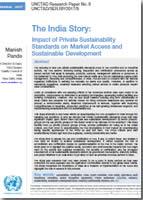
With almost 500 private sustainability standards (PSS) in 199 countries and 25 industrial sectors, the PSS system, involving testing, inspection and certification procedures across all market sectors which apply to samples, products, services, management systems or personnel, has become the new market reality as a tool for sustainable supply-chain management, marketing and competitiveness.
In India, PSS are seen to compete with the national regulatory institutions in defining the mandate for safety and quality. Therefore, in addition to mandatory regulations, voluntary measures affecting market access of Indian products require close consideration.
Costs of compliance with eco-labelling criteria in the numerous sectors have been found to be prohibitive, compounded by difficulties in accessing technologies, developing testing facilities and verifying compliance.
However, PSS do take steps towards ensuring long term sustainability of value chains and prepares the national market for rising consumer awareness and demand for product and environmental safety, livelihood improvement of workers, together with improving competitiveness of industries, production practices of the fast-growing smallholder segment, and mainstreaming smallholders into the sustainability fold.
This study attempts to fuel these efforts by understanding the PSS ecosystem in India through the following key questions:
-
Why we discuss that Private Sustainability Standards (PSS) may have significant impact upon India's trade success and sustainable development?
-
Which productgroups are the key priority groups for this study? What is the rationale for the selection?
This study identify three priority product groups (PPGs), provide justification for doing so in the Indian context, and then move to understanding the PSS implications in their market by understanding taking specific approached to the PPGs as best suit them. The PPGs chosen (and later substantiated) include agri-food (tea and grapes), forestry (handicrafts) and textile.
The study aims to assess the role and contribution of PSS (with focus on the PPGs), if any, to India’s trade, and analyse if PSS have an impact to achieve sustainable development. It further explores the role of accreditation and certification bodies for operationalisation of the PSS in the Indian context.
The study goes on to highlight the positive social, economic and environmental impacts that PSS might have on the society and business ecosystem, the benefits of certification, and the increased endorsement of the sustainability standards system by government mechanisms, statutory entities, and policy initiatives in an India which is yet wary of them as potential technical barriers to trade. While doing so, the endeavor learns from the good practices being followed in similar areas across the world and highlight them wherever necessary.
The study also observes that PSS have proved to be a boon in some sectors as they have connected the local populace and the agriculture commodities directly to the global value chains.
The study also puts forth that it is essential for businesses to imbibe sustainability in their DNAs and governments must create conditions for ensuring this result. The study recognises the importance of trade as a measure of implementation of the SDGs and highlights the role of MSMEs in this process. It’s essential, therefore, to address the issues of duplication, accountability, traceability, legitimacy and costs in the implementation of PSS so that MSMEs can more extensively utilize the benefits of the same.
In conclusion, this study will be an input to the Steering Committee (SC) and the Multi-Stakeholder Committee (MSC) of the India National Platform on Private Sustainability Standards. They function as forums for exchange of views on key PSS issues among Indian PSS stakeholders. The SC and MSC include members from the government, statutory agencies, commodity boards, private stakeholders, industry associations, consumer bodies, and any other non-governmental institution as deemed fit by the Secretariat and the Charter of the Platform.
The study will support deliberations in the Committee and strengthen the Committee’s work.


